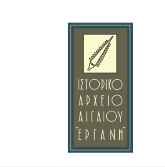

|


|
||
| Collections Types Dates Originators Titles Subject categories | ||
“Ergani”, the historical archive of the AegeanThe historical archive of the Aegean “Ergani” collects, preserves and showcases archival material that illustrates life in the last two centuries in the north-eastern Aegean. Its rich archival collections include rare documents, photographs, amateur films from the 1930s, diaries, personal and business correspondence, ads, industrial designs, drawings and scientific reports. They vividly showcase daily life and the development of the olive oil industry on the island of Lesvos during those years of socio-economic and political change. Special place in the archive holds the Kourtzis family archive, a unique testimony that spans 4 generations of local entrepreneurs. The historical Archive of the Aegean “Ergani” is a non-for-profit organisation founded in 2002 and based in Mytilene, the capital of Lesvos. “Ergani”, an innovative inventionThe archive is named “Ergani” after an internationally recognised and patented olive collection machine invented by Mitsas Kourtzis in 1924. The invention was innovative for its time and got recognition not only in Greece, but in other Mediterranean countries, where olive oil production is a core industry. It was presented in various international conferences and international journals of its time. Investing in best practice archives management“Ergani” aims to preserve and showcase Greek cultural heritage represented in the Archive. That is why it invests in improving its archive management infrastructures and know-how, applying the latest methodology in preservation, research and documentation of local archives and participating in international forums on digital heritage. The repositoryThe repository is an integrated information platform for the management and showcasing of Ergani archival collections. It offers access to organized and documented archival material with the aim of facilitating historical research of the socio-economic developments in the NE Aegean during the 19th and 20th centuries. DocumentationThe archival collections were documented using internationally recognized metadata schemas and incorporating authorities for types, subject headings, people, corporate bodies and families, ensuring easy access to information and inter-operability. Archival documentation in the repository is based on the Encoding Archival Description metadata schema (EAD) and follows the General International Standard Archival Description (ISAD-G) 2nd edition of the International council on Archives. Repository usersHistorians, researchers, students, visitors to and residents of the NE Aegean and those interested in historical and ethnographic content can access documented archival records. The Repository offers dynamic search functions, registration and profile personalization and access to full metadata records and digital objects.
|
|
|